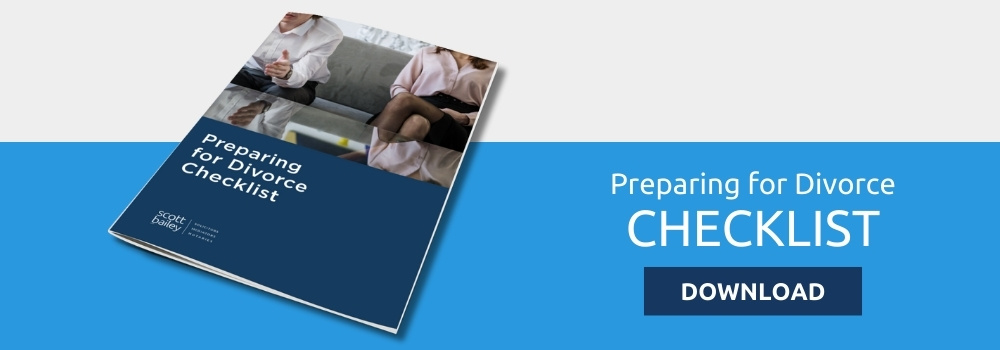Wondering how to protect assets from divorce? Whether you’re preparing to get married or preparing for a divorce, it’s a sensible question to be asking.
In this guide, we’ll break down how you can protect your assets, both before you get married and during a divorce.
Types of assets
When preparing for a divorce, there are two types of assets you need to consider: matrimonial assets and non-matrimonial assets and pensions.
Matrimonial assets
As the name suggests, matrimonial assets include any financial assets that were acquired during your marriage. Under UK law, both parties are entitled to a share of these assets regardless of who provided the funds.
Matrimonial assets commonly include:
- Property
- Pension plans
- Investments
- Savings
- Cars
- Furniture
- Other shared possessions
In some cases, assets acquired before your marriage can still be counted as matrimonial assets, including property purchased as a family home.
Non-matrimonial assets
Non-matrimonial (or premarital) assets are financial assets you acquired before your marriage. Unlike matrimonial assets, you can request that these assets are excluded from your Financial Settlement.
Non-matrimonial assets commonly include:
- Inheritance
- Family businesses
- Property purchased before the marriage
Are premarital assets protected from divorce?
Premarital assets can be protected during a divorce if the court grants your request to exclude them from your financial settlement.

Asset protection divorce strategies
When it comes to protecting your assets, the best strategy is to be prepared. If you have assets you want to protect from divorce, it’s much easier if you take precautions before getting married. Options at this stage include prenuptial and postnuptial agreements, loans, and trusts.
That being said, even if you haven’t taken precautions, there are still steps you can take to protect your assets from divorce, including seeking proper legal advice, remaining in your family home and avoiding moving in with a new partner.
How to protect your assets from divorce before you get married
Prenuptial agreement
There’s no better option for protecting your assets from divorce than a prenuptial agreement.
A prenup is a contract that you and your spouse make before getting married which sets out who owns your belongings, assets, property and money, as well as how they will be divided should your relationship end in divorce or separation.
Unfortunately, there’s a real stigma around prenups. They’ve been painted as unromantic and there’s often negative connotations around one party getting an unfair deal. In actual fact, making these arrangements whilst your relationship is in a good place often helps couples make much more rational and fair decisions about how their assets should be shared, should the worst happen.
As divorce lawyers, we deal with the consequences of couples not taking this precaution on a daily basis and we’re desperate to see prenups normalised, as are the Family Justice Council. Rather than viewing a prenup as preparing for divorce, it’s better to view it as ensuring your family is protected in the future.
Divorces without prenups can often end up being costly and emotionally challenging for you, your spouse, and any children you may have.
Are prenuptial agreements legally binding?
In short, no. However, they are becoming increasingly reliable as a means of protecting assets from divorce, as long as they follow strict guidelines:
- A prenup must be signed well in advance of your wedding to show it was not signed under duress.
- A prenup must provide a full and frank disclosure of both party’s finances.
- Both parties must take independent legal advice before signing the agreement.
Even if these guidelines are followed, there are still reasons a prenup may not be accepted in court, including significant changes to the financial situation of either party.
Whilst they don’t provide ironclad protection, prenups are becoming increasingly common and there is a strong movement within the UK legal system to formalise their status. The Family Justice Council has recommended the introduction of Qualifying Nuptial Agreements, which will act as a legally binding prenup.
Postnuptial agreement
Slight red herring here. As the name would suggest, a post-nuptial agreement is an agreement you make after you’ve married. Whilst this option doesn’t exactly fit in this category, we’ve included it here because it’s a precaution you can take to protect your assets should your relationship end in the future.
A post-nup agreement is a contract between you and your spouse that details how your assets and property will be split, as well as arrangement for your children, should you get divorced.
Are post-nup agreements legally binding?
Again, the answer here is no. As with prenups, post-nups are not currently legally binding. That being said, if you take similar steps to ensure both parties fully understand the implications of the contract and have not signed under duress, your post-nup will hold much more weight in court.
Loans
One of the assets we’re most frequently asked about protecting is family wealth. When gifting significant sums of money, parents or other family members often have concerns about what will happen to it in the event of a divorce.
That’s where loans come in. Financial gifts have little protection when couples divorce. However, money provided as a loan from a family member is much easier to protect. In the event of a divorce, the contribution is likely to be viewed as a loan that needs to be repaid, preventing the money from going into the pocket of an estranged spouse.
Loans are great for protecting family wealth during a divorce, but they can still be disputed. Your partner may argue that the loan was actually a ‘soft loan’ or gift, which was never expected to be repaid. If the court agrees, the money will be factored in to your final settlement.
To avoid this happening, you’ll need a loan agreement detailing the total amount being lent, the reason for lending it and the terms and conditions for repayment. The agreement should be signed at the time the money is lent.
Trusts
Like loans, trusts are often used to protect family wealth. Family members can place assets within a trust to ensure that they remain with the intended beneficiaries.
Whilst trusts can be very effective, they are also open to attack for a number of reasons. If you’re looking to protect family wealth using a trust, it’s incredibly important to consult proper legal advice to ensure the trust is set up correctly and will protect your assets in the event of a divorce.
How to protect your assets from a divorce
As mentioned already, preparation is the best defence, but hindsight is 20/20 and if you’ve not taken any of these precautions, you’d be in the majority. All is not lost though. With the right legal advice, there are still lots of options at your disposal when it comes to protecting your assets.
Seek proper legal advice
We can’t stress this one enough. Finding a good divorce lawyer as early in the process as possible will pay dividends. A divorce is tricky to navigate and making decisions without proper legal advice can have serious consequences.
An experienced divorce lawyer will be able to guide you through the process, ensure your assets are as protected as possible, and deliver an outcome you’ll be satisfied with.
At Scott Bailey, we’ve specialised in family law for over 30 years. Whether you reach a settlement outside of court or need us to protect your interest in court, we’ve got the knowledge and experience to deliver the best possible outcome on your behalf.
Ringfence pre-acquired or post-acquired assets
If you have non-matrimonial assets you want to protect, you need to ringfence them throughout your marriage. The protection awarded to non-matrimonial assets is weakened if they have been used to financially support you and your spouse during your marriage. This can include money you’ve withdrawn from a trust or that you’ve gained from additional properties you own.
You should also be wary of using money from assets you’ve acquired after you’ve separated to support your spouse prior to your divorce settlement being finalised. As with pre-acquired assets, doing so could give them some rights to those assets.
Don’t hide assets
Often, the knee jerk reaction to getting a divorce is to try and hide or protect assets, whether that’s using a trust, by transferring them to a third-party, or by moving them offshore. Don’t do it. Courts don’t look kindly on this kind of behaviour. Not only will the transfer of assets be reversed, but your behaviour may have other serious implications for the final settlement that’s agreed.
If you have assets you want to protect, speak to your divorce lawyer. They will be able to advise you on the best steps to take, helping you protect your assets without leaving you at odds with the court.
Don’t move out of your family home
Whilst it might be uncomfortable to stay, avoid moving out of your family home. Leaving your spouse with the house and any children you may have, puts them in a strong position to argue that they are the primary carer and therefore has a greater housing need.
It’s important to stress that you should only remain in your family home if it’s safe to do so. If it’s not safe to stay, speak to a divorce lawyer as quickly as possible. There are safeguarding steps that can be taken to ensure your safety, whilst avoiding any negative repercussions from moving out.
If you do have to leave, don’t move in with a new partner. In the eyes of the court, your finances will be combined, and it will impact your final settlement.
Take steps to protect your right to the family home
When it comes to divorce settlements, few assets are more important than property. For lots of couples, the family home is the most valuable joint asset. Knowing that your home will be protected or that you’ll get a fair share of the property can bring some peace of mind during such an unsettling time.
The best way to protect your family home is to speak to a divorce lawyer – they will be able to advise you on any action you need to take. That being said, there are also a few points you should consider.
Family homes fall within the category of matrimonial assets, which under UK law means that both parties are entitled to a share of it.
What happens if the property is solely in your partners name though? If this is the case, you will need to take some action to protect your rights to the property. If your family home is registered at the Land Registry, you can protect your rights using a ‘matrimonial home rights notice’ or ‘home rights notice’. For more information on protecting your rights to a property, visit Money Helper.
Don’t take documents without permission
Whilst you’re still living together, you might be tempted to take or make copies of your partner’s financial documents. Don’t! Taking documents without permission will reflect badly on you in court and it’s just not necessary. Any documents taken without permission won’t be admissible and the courts will be able to access your partner’s financial information anyway.
Protect property from divorce
So, we’ve looked at the family home. What about other property that you own? As we covered earlier, property that you owned prior to getting married can be classed as a non-matrimonial asset, as long as it wasn’t used as your family home. As such, you can make a request to the Family Court that this property be excluded from your financial settlement. This will offer some protection for your property if the request is granted.
If additional properties are in your partners name, you can register unilateral notices against these properties to prevent your partner disposing of or mortgaging the property during divorce proceedings. You will need to prove your interest in the property in order for the unilateral notice to be granted though.
We’re here to help
If you’d like to speak to one of our divorce solicitors, our specialist team is on hand to help – get in touch today.







